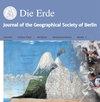全球化农业食品工业中的原产国标签——以“德国制造”猪肉为例
IF 0.6
4区 地球科学
Q3 GEOGRAPHY
引用次数: 1
摘要
毫无疑问,近年来食品的来源变得越来越重要,这在相关标签的商业发布中得到了重要反映。特别是在农业食品部门日益全球化的时代,强调原产国效应可能会成为一个额外的卖点。猪肉行业也是如此,我们将以“德国制造”猪肉为例来说明这一点。因此,目前德国猪肉出口的成功显然是积极的质量特征的结果,这些特征(主观上)来源于国家来源。由于具有显著的增值潜力,几个东亚市场对“德国制造的优质猪肉”的需求日益增长,这一点尤为重要,这促使猪肉生产商强调德国原产地的“好处”,并相应地塑造其上游供应关系。因此,从丹麦或荷兰进口猪的养猪户被排除在这些生产线之外。因此,对原产国效应的强调伴随着生产网络空间组织的改变。本文章由计算机程序翻译,如有差异,请以英文原文为准。
Country-of-origin labelling in the globalizing agrifood industry – the example of pork ‘made in Germany’
The provenance of food has without any doubt become more important in recent years which is not least reflected in the commercial launch of relevant labels. Especially in the era of an increasingly globalizing agrifood sector, the emphasis on country-of-origin effects could appear as an additional selling point. This is also true for the pork industry which will be shown by using the example of pork ‘made in Germany’. Therefore, the current export success of German pork is obviously a result of positive quality features which are (subjectively) derived from the national provenance. The growing demand for ‘quality pork made in Germany’ in several East Asian markets, which are particularly important due to remarkable value-added potentials, has led pork producers to highlight the ‘benefits’ of German origin and to accordingly shape their upstream supply relations. As a result of this, pig fattening farmers who import their pigs from Denmark or the Netherlands are excluded from these production lines. The emphasis on country-of-origin effects is thus accompanied by modifications of the spatial organization of production networks.
求助全文
通过发布文献求助,成功后即可免费获取论文全文。
去求助
来源期刊

Erde
GEOGRAPHY, PHYSICAL-GEOSCIENCES, MULTIDISCIPLINARY
CiteScore
2.90
自引率
6.20%
发文量
0
审稿时长
>12 weeks
期刊介绍:
DIE ERDE is a publication of the Geographical Society of Berlin
DIE ERDE is a scientific journal in Geography, with four issues per year with about 100 pages each. It covers all aspects of geographical research, focusing on both earth system studies and regional contributions.
DIE ERDE invites contributions from any subfield of both Physical and Human Geography as well as from neighbouring disciplines.
 求助内容:
求助内容: 应助结果提醒方式:
应助结果提醒方式:


